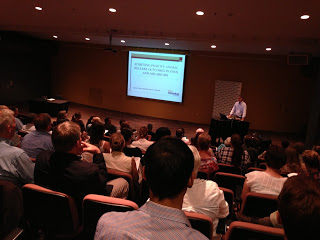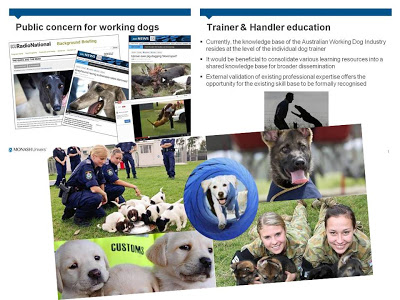Dogs
 Hi Julie,
Hi Julie,
what a week! Thanks for all that great information about The Sounds of Dogs, that was so interesting. I definitely recognise differences in the way my dogs bark. They have very different vocalisations for "strange person at the door", "someone familiar that I'm excited to see at the door" and "Oh my goodness, you just did something that we're not meant to do!" (that last one is ALWAYS Elke 'dobbing' on Caleb - she would have totally been the teacher's pet in a classroom environment!).
The RSPCA Australia Scientific Seminar in Canberra was a fantastic day. So many interesting presentations on various topics all focussing on the day's theme:
When coping is not enough
- promoting positive welfare states in animals.
 The keynote presentations from David Mellor and James Yeates were (as expected!) really thought-provoking in regard to the journey animal welfare science has taken over the past thirty years and the recent focus on animal affective states (we can probably just call them animals feelings/emotions).
The keynote presentations from David Mellor and James Yeates were (as expected!) really thought-provoking in regard to the journey animal welfare science has taken over the past thirty years and the recent focus on animal affective states (we can probably just call them animals feelings/emotions).
It was fabulous to see so many friends and fellow scientists from all over Australia and hear about their latest news regarding zoo, companion, livestock, working and even pest animal research.
As you know, we're moving from understanding how animals cope in welfare-poor environments and taking a huge leap to try and learn how we can help them flourish. Exciting times!
Here are a few of the notes I wrote down while listening to talks on the day:
 - Importance of teaching undergraduate students to assess the complexities of animal welfare issues objectively; use of e-simulation programs to enhance student understanding of animal welfare practices and economic/production components to decisions (Susan Hazel)
- Importance of teaching undergraduate students to assess the complexities of animal welfare issues objectively; use of e-simulation programs to enhance student understanding of animal welfare practices and economic/production components to decisions (Susan Hazel)
- Animal welfare is about people as much as it is about animals
- Australian dogs spend a lot of time in residential backyards monitoring for their owners' return from work. Most separation anxiety behavioural issues related to this management practice can be resolved by giving dogs access to indoors; preferably to owner's bed; but access to worn socks/underwear can also help if bed not available. (Robert Holmes)

- Re: texting during talks -- Blackberries are loud, iPhones are quiet (but bright!)
- Death is not an animal welfare issue (assuming done humanely) ??? If considered as deprivation of a life worth living, it might be.
- Future will move from species-specific provision of welfare to greater individualism. Challenge in developing codes of practice/welfare to provide for individual but still be functional at herd/group/facility level
As you can see, there were some really huge ideas being thrown about the room!
I'll be sure to let you know when the full papers come out in the proceedings from this excellent day. I am so grateful to have been given the opportunity by RSPCA Australia to speak among such a great line up.
There's so much to think about in the wake of all the amazing talks, I think I just need to go and think!
What's been on your mind lately?
Mia
Further reading:
Green T. & Mellor D. (2011). Extending ideas about animal welfare assessment to include ‘quality of life’ and related concepts, New Zealand Veterinary Journal, 59 (6) 263-271. DOI: 10.1080/00480169.2011.610283
Hazel S.J., Signal T.D. & Taylor N. (2011). Can Teaching Veterinary and Animal-Science Students about Animal Welfare Affect Their Attitude toward Animals and Human-Related Empathy?, Journal of Veterinary Medical Education, 38 (1) 74-83. DOI: 10.3138/jvme.38.1.74
Yeates J.W. (2010). Death is a Welfare Issue, Journal of Agricultural and Environmental Ethics, 23 (3) 229-241. DOI: 10.1007/s10806-009-9199-9
© Mia Cobb 2013
- Do You Believe In Dog? One Year Of Believing.
Happy anniversary Julie! Can you believe we've been exchanging blog posts about canine science for one year already? In some ways it's gone so quickly and in others it's hard to remember when we weren't. I was going to do a highlights...
- Dogs & Cats, Cats & Working Dogs, Working Dogs & Emotions
Hi Julie! What a busy week I’ve found myself having! Very productive indeed, with a lot of this: and some more of that: Fuelled by a ton of this: But I did take time to notice that your cat Josh broke something new. Oh Josh! ...
- Zoos And An Enlarged Dachshund Wrapped Up In Welfare
(Source)I can wait for you to talk about humping in working dogs later. I’m assuming humping didn’t come up at the AAWSome conference -- maybe something for the conference suggestion box? I haven’t seen any humping recently, although LOADS of people...
- I'll Show You Mine If You Show Me Yours!
Yep - that adult (green coat) having more fun than any kid? That's me.Hey Julie, We had a fun weekend, there were miniature trains involved, so how can that be anything other than fabulous? I hope you did too! Can I firstly say – !!!! –...
- So Much Dog To Talk About. All The Time In The World!
(source)Hi Mia, Yowzer!! We have so much to talk about! Dogs eating poop, welfare assessment, behavioural needs, enrichment and the “guilty look” are only the beginning! Speaking of which, I’m sure you have at least 7,000 more words...
Dogs
RSPCA Australia Scientific Seminar 2013: Recap
 Hi Julie,
Hi Julie,what a week! Thanks for all that great information about The Sounds of Dogs, that was so interesting. I definitely recognise differences in the way my dogs bark. They have very different vocalisations for "strange person at the door", "someone familiar that I'm excited to see at the door" and "Oh my goodness, you just did something that we're not meant to do!" (that last one is ALWAYS Elke 'dobbing' on Caleb - she would have totally been the teacher's pet in a classroom environment!).
The RSPCA Australia Scientific Seminar in Canberra was a fantastic day. So many interesting presentations on various topics all focussing on the day's theme:
When coping is not enough
- promoting positive welfare states in animals.
It was fabulous to see so many friends and fellow scientists from all over Australia and hear about their latest news regarding zoo, companion, livestock, working and even pest animal research.
 |
| Some of the slides from my presentation about the welfare of working dogs. |
Here are a few of the notes I wrote down while listening to talks on the day:
- Animal welfare is about people as much as it is about animals
- Australian dogs spend a lot of time in residential backyards monitoring for their owners' return from work. Most separation anxiety behavioural issues related to this management practice can be resolved by giving dogs access to indoors; preferably to owner's bed; but access to worn socks/underwear can also help if bed not available. (Robert Holmes)

- Re: texting during talks -- Blackberries are loud, iPhones are quiet (but bright!)
- Death is not an animal welfare issue (assuming done humanely) ??? If considered as deprivation of a life worth living, it might be.
- Future will move from species-specific provision of welfare to greater individualism. Challenge in developing codes of practice/welfare to provide for individual but still be functional at herd/group/facility level
As you can see, there were some really huge ideas being thrown about the room!
I'll be sure to let you know when the full papers come out in the proceedings from this excellent day. I am so grateful to have been given the opportunity by RSPCA Australia to speak among such a great line up.
There's so much to think about in the wake of all the amazing talks, I think I just need to go and think!
If you'd like to get into the thick of my current mind-space, you can check out the Public Lecture 'How happy does a happy animal have to be (and how can we tell)? given by James Yeates (essentially the same as his keynote address) recorded in Melbourne, the day after the Canberra event:
How happy does a happy animal have to be (and how can we tell?) from Animal Welfare Science Centre on Vimeo.
What's been on your mind lately?
Mia
Further reading:
Green T. & Mellor D. (2011). Extending ideas about animal welfare assessment to include ‘quality of life’ and related concepts, New Zealand Veterinary Journal, 59 (6) 263-271. DOI: 10.1080/00480169.2011.610283
Hazel S.J., Signal T.D. & Taylor N. (2011). Can Teaching Veterinary and Animal-Science Students about Animal Welfare Affect Their Attitude toward Animals and Human-Related Empathy?, Journal of Veterinary Medical Education, 38 (1) 74-83. DOI: 10.3138/jvme.38.1.74
Yeates J.W. (2010). Death is a Welfare Issue, Journal of Agricultural and Environmental Ethics, 23 (3) 229-241. DOI: 10.1007/s10806-009-9199-9
- Do You Believe In Dog? One Year Of Believing.
Happy anniversary Julie! Can you believe we've been exchanging blog posts about canine science for one year already? In some ways it's gone so quickly and in others it's hard to remember when we weren't. I was going to do a highlights...
- Dogs & Cats, Cats & Working Dogs, Working Dogs & Emotions
Hi Julie! What a busy week I’ve found myself having! Very productive indeed, with a lot of this: and some more of that: Fuelled by a ton of this: But I did take time to notice that your cat Josh broke something new. Oh Josh! ...
- Zoos And An Enlarged Dachshund Wrapped Up In Welfare
(Source)I can wait for you to talk about humping in working dogs later. I’m assuming humping didn’t come up at the AAWSome conference -- maybe something for the conference suggestion box? I haven’t seen any humping recently, although LOADS of people...
- I'll Show You Mine If You Show Me Yours!
Yep - that adult (green coat) having more fun than any kid? That's me.Hey Julie, We had a fun weekend, there were miniature trains involved, so how can that be anything other than fabulous? I hope you did too! Can I firstly say – !!!! –...
- So Much Dog To Talk About. All The Time In The World!
(source)Hi Mia, Yowzer!! We have so much to talk about! Dogs eating poop, welfare assessment, behavioural needs, enrichment and the “guilty look” are only the beginning! Speaking of which, I’m sure you have at least 7,000 more words...
